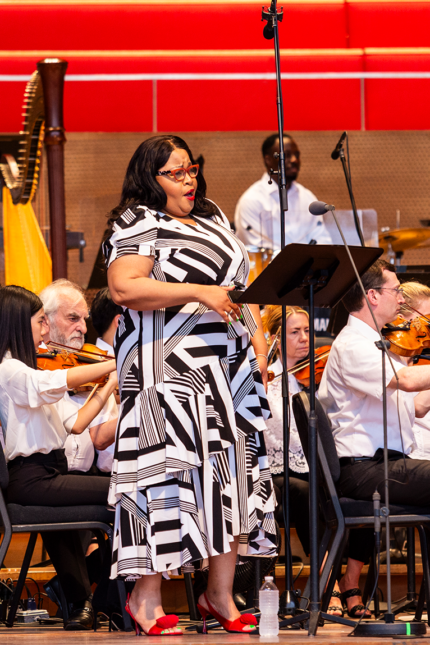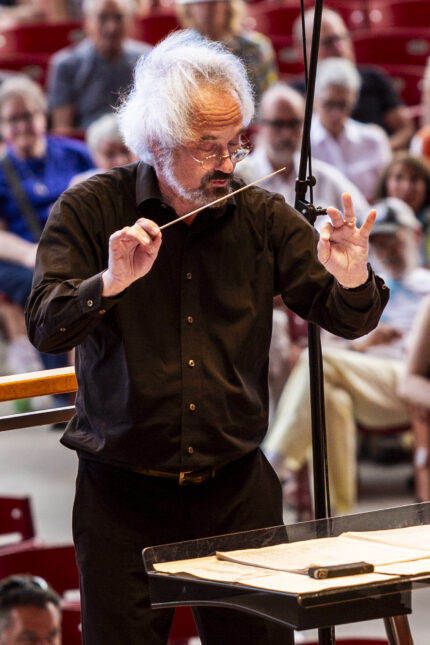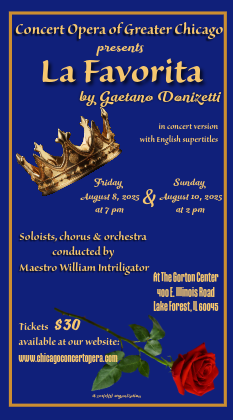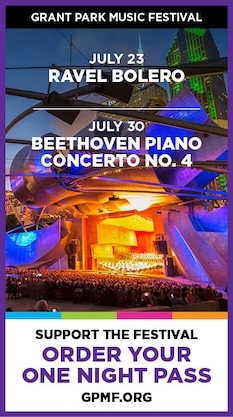Soprano Slack brings heartening spirit of freedom to Montgomery songs

Carlos Kalmar, now in his 25th and final season as the Grant Park Orchestra’s principal conductor (and since 2011 the Grant Park Music Festival’s artistic director), has a keen eye for programming. Wednesday night’s concert at the Jay Pritzker Pavilion wasn’t simply an appropriate celebration of Juneteenth. Yes, two works by black composers focused on the racial struggle for freedom. And yes, there were two overtures from Beethoven’s Fidelio, an opera about a loving wife’s victorious struggle to free her imprisoned husband.
But something more subtle was at work as well. Beethoven wasn’t simply writing an opera about a fight for freedom. He was battling to achieve an elusive goal in his own professional life. He desperately wanted to write an opera, but, as it turned out, he wasn’t very good at it. Beethoven labored over Fidelio, his only opera, for ten years, eventually writing four different overtures for it.
Of course there is no moral equivalency between failing to reach a professional goal and a people struggling against slavery. But the themes of not giving up, of living to fight another day against all odds, became touchingly intimate Wednesday night.
The evening’s highlight was Jessie Montgomery’s Five Freedom Songs, written in 2017-18 for soprano, string orchestra and percussion. In her setting of five spirituals, Montgomery supports the original tunes with deftly textured, often unsettling orchestration.
The utterly stunning soloist was Karen Slack, an artist with a thriving international career and recently named artist-in-residence for Lyric Opera of Chicago’s Lyric Unlimited initiative. Slack’s soprano is powerfully noble and elegant, with a smoky, dark undercurrent. At one point in “My Lord, What a Morning,” her rich, luxurious vocal line easily defeated the wail of a passing siren.
Underscored by Kalmar’s attentive conducting, Montgomery’s interplay between soloist and orchestra was fascinating. In the first three songs—“What a Morning,” “I Want to Go Home,” and “Lay dis Body Down”—the orchestra seemed to inhabit its own universe. A plaintive violin solo opened “I Want to Go Home,” but as Slack filled the air with desperate longing, the orchestra’s dark rustling added a quietly ominous note. Montgomery’s music is rarely harshly dissonant. Rather than fierce confrontations between soloist and orchestra, the music expressed something worse: indifference to another human being’s pain.
The relationship shifted in the final two songs, “My Father, How Long?” and “The Days of Judgment.” The orchestra picked up cues from Slack’s melodic lines, becoming her sympathetic partner. In “How Long?” cellos and double basses created a lively clatter, slapping bows against strings, providing constant, rhythmic support to Slack’s often indignant questions. As Slack let loose with heaven-storming vocal fireworks in “Day of Judgment,” the playfully energetic orchestra soared along with her.

Written in 1964 after the notorious civil rights clashes in Montgomery, Ala., Margaret Bonds’ The Montgomery Variations exploits the large symphony orchestra’s full range. Set in seven movements with such titles as “Decision,” “March,” “Dawn in Dixie” and “Benediction,” it portrays both the civil rights struggle and the longing to find peace in a familiar, beloved landscape.
In “One Sunday in the South,” sections of the orchestra entered in layers, some somber, some playful, like congregants mingling and chatting as they arrived for church. The more serious sections—”March,” “Lament” and “Benediction”—were full of relentless determination. The orchestra surged into long, sweeping melodies, at times full of pain, at other times joyful. But under all the ardent emotion, Kalmar emphasized a quiet fortitude, a sense of unstoppable forward movement.
The Grant Park Orchestra was impressive, both in Bonds’ piece and the two Beethoven overtures. Under Kalmar’s direction its sound is expansive and flexible, with a burnished, golden glow. Beethoven’s Overture to Fidelio, the one usually performed these days when the opera is staged, is brief and full of Beethoven’s typically abrupt shifts between short, brutal rhythms and more melodic moments. On Wednesday night it unfolded like a harmonious quilt rather than a jagged collage. The second overture, Leonora Overture No. 3, is a concert-hall favorite, and the Grant Park Orchestra luxuriated in its slow, brooding moments as well as its glittering, high-speed finale.
Carlos Kalmar leads the Grant Park Orchestra in Prokofiev’s Symphony No. 6, Gabriela Lena Frank’s Apu, and Schumann’s Piano Concerto with soloist Garrick Ohlsson 6:30 p.m. Friday and 8 p.m. Saturday. gpmf.org
Posted in Performances

